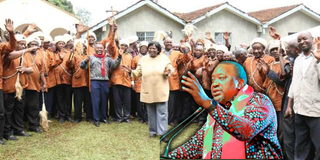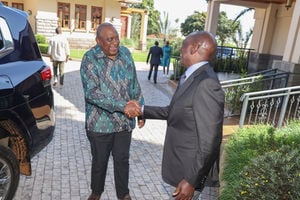
Uhuru Kenyatta chose to host President William Ruto at Ichaweri, Gatundu, despite owning other homes.
By the time the founding father of the nation, Mzee Jomo Kenyatta, passed away in August 1978, he had transformed his rural home in Ichaweri, Gatundu, into a political shrine.
This was the home to which he dutifully retreated in the evenings when he was working in Nairobi. He was also known to hold Cabinet meetings there, in what is now Gatundu South Constituency.
His son, Uhuru Kenyatta, who ascended to the presidency in 2013, appears to be retracing his father’s footsteps by hosting significant gatherings in Ichaweri. Recently, he hosted President William Ruto at the historic compound. Other high-profile visitors, including Western diplomats, have also been pictured in meetings held there.
Political and cultural analysts now see parallels between Mzee Kenyatta’s habit of dealing with political matters from his rural home and what his son is currently doing, especially following his meeting with Dr Ruto in the same location.
It is rumoured that beyond the official statements issued after the meeting, President Ruto brought goats to his predecessor as part of a purification ritual to ease the “bad blood” between the two, stemming from their fallout in 2018. This rift culminated in President Kenyatta opposing Dr Ruto’s presidential bid and instead supporting opposition leader Raila Odinga.
During their campaigns, the two leaders traded harsh words, and even after Dr Ruto defeated Mr Odinga, hostilities continued. Mr Kenyatta’s family and businesses faced public vilification, his mother, Mama Ngina Kenyatta, was shamed, and their Northlands Estate was raided, with livestock stolen and parts of it destroyed. Furthermore, the government was accused of denying Mr Kenyatta his retirement perks in a show of harassment.
Furthermore, insiders hint that the meeting may have touched on contentious issues, such as safeguarding the Kenyatta family’s extensive business interests, which were subject to public scrutiny and political attacks during and after the 2022 elections. Some also speculate that
within the Mount Kenya bloc, especially after the impeachment of Deputy President Rigathi Gachagua, whose influence in the region has significantly waned.
“It was a matter of political necessity that the two met in Ichaweri, shared meals and drinks, and discussed wide-ranging issues, including revisiting a 1966 incident where Daniel arap Moi rose to the vice presidency after Joseph Murumbi’s resignation,” said an elder privy to the events but who requested anonymity to maintain ties with the Kenyatta family.
For cultural purists and former freedom fighters in Mt Kenya, Ichaweri holds deep significance.
“I joined the provincial administration in the mid-1970s and served as a district officer in Nairobi. President Kenyatta identified me through his confidants as someone who could serve his cause,” recalls retired administrator Joseph Kaguthi.
Mr Kaguthi reveals that after Mr Murumbi resigned as vice president, Kalenjin elders visited Ichaweri and endorsed Mr Moi as the preferred replacement. “It is this historical connection that makes the Ruto-Kenyatta Junior meeting in the same venue intriguing,” he said.
“Mzee Kenyatta’s primary passion regarding residence was his family home,” Mr Kaguthi added, noting that the founding president often reminded visitors to his Gatundu home that a man without a rural home was nothing. Whenever Mzee Kenyatta needed to meet a delegation, Ichaweri was the automatic venue.
With President Ruto and Mr Kenyatta now seemingly aligned for a significant political partnership, attention has shifted to Gatundu as the stage for a potential political realignment ahead of the 2027 General Election.
Political analysts argue that the Gatundu meeting between the two leaders is not merely a reconciliation of personal differences but could signify a broader political realignment ahead of the 2027 General Election. The political fallout between Ruto and Kenyatta left deep fractures within their shared political base, particularly in the Mount Kenya region, and this meeting could be a step towards mending those divisions.
Although Mt Kenya currently appears hostile to President Ruto, particularly after the fallout with Deputy President Rigathi Gachagua, some believe the “Ichaweri charm” might shift the region’s political dynamics.
“Just like his son, Mzee Kenyatta tackled challenging political tasks from Gatundu,” said Kung’u Muigai, Mzee Kenyatta’s nephew and Uhuru Kenyatta’s cousin. “During Mzee Kenyatta’s rule, Ichaweri was like an extension of State House, alongside other places like Nakuru and Mombasa,” added Mr Muigai.
Unlike his father, Uhuru Kenyatta has homes across the country and abroad. Yet, he chose Ichaweri to host his successor, underscoring the significance of the location.
“My uncle firmly believed that discussions held in his home retained his authority as the venue’s private owner and carried his full imprimatur,” Mr Muigai explained, adding that even the controversial oathing ceremonies in Mt Kenya during the late 1960s were conceived there.
The oaths involved pledges that the presidency would never leave Central Kenya.
“If Ichaweri’s walls could speak, they would reveal stories of politicians, elders, clergy, and others shaping major decisions—or nursing disappointments—as they met there,” Mr Muigai remarked.
Mzee Maigua Mbatia, 86, a Kikuyu elder, described Ichaweri as a revered site. “Anyone who speaks ill of it attracts backlash,” he said, referencing an incident where former Gatundu South MP and Cabinet Secretary Moses Kuria threatened to urinate on Ichaweri’s gates. Ichaweri’s presence in Gatundu South Constituency has not been without controversy. Gatundu North MP Elijah Kururia lamented that his constituency is often overshadowed by the legacy of Gatundu South.
“When people hear Gatundu, they assume we share the glory attached to Ichaweri. They don’t realise Ichaweri is in Gatundu South, while Gatundu North is often overlooked,” Mr Kururia said. To escape this perception, he is pushing for his constituency to be renamed Mang’u.
“Public participation has shown overwhelming support for Mang’u as the preferred name. Freedom is coming,” Mr Kururia said.
The Kenya Year Book reports that as if that wasn’t bad enough, the stones from Mzee’s houses were used to build a government residential house in Gatundu. It adds that after Mzee Kenyatta was released from Kapenguria, the land had already been purchased by someone else. It took persistence to get it back.
“Since Kenyatta was technically landless and homeless, the Government was willing to construct a new house for him but he insisted that he would only settle in his original home and land in Ichaweri,” says the Year Book. Mzee Kenyatta preferred working in Nairobi and retreating to Ichaweri in the evening. Mr Robert Mugo Mboi, a former General Service Unit constable, told Nation in 2022 that the same applied to Mzee’s children: they were driven to school in Nairobi in the morning and ferried back in the evening.
Additional reporting by Elvis Ondieki










